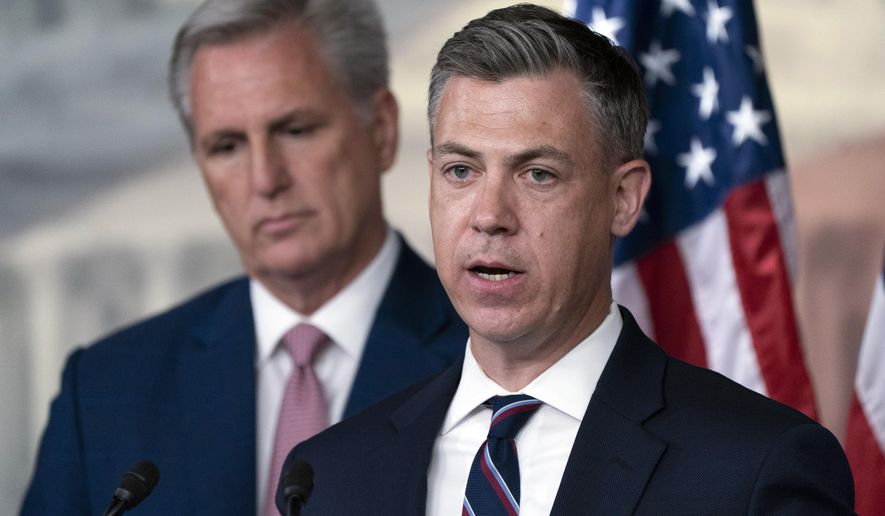House Armed Services Committee Republicans on Thursday grilled Pentagon officials over the Department of Defense’s efforts to bolster diversity, equity and inclusion in the services, warning that efforts to curb bias in the ranks are politicizing the troops and eroding military readiness.
Military Personnel subcommittee Chairman Jim Banks said the Pentagon’s “DEI apparatus” is putting at risk “one of the most meritocratic organizations in the United States of America.”
“This comes at a time when existential threats from China and Russia have never been as pronounced as what they are and at a time when recruiting struggles put our all-volunteer force on the brink,” said Mr. Banks, Indiana Republican.
Citing a Pentagon report to the Senate Armed Services Committee, Mr. Banks said the Defense Department had dedicated 5,359,311 staff-hours on anti-extremism training mandated following the Jan. 6, 2021 attack on the Capitol, and an additional 529,711 staff-hours “on DEI-specific training.”
“That is a lot of training hours spent away from honing war-fighting capabilities, knowledge and skills,” he said.
Diversity initiatives under the Biden administration have become a key focus among Republicans and have led to a series of headline-grabbing dustups at congressional hearings, marked by tense lines of questioning and accusations of top-down political ideology seeping into all levels of government.
SEE ALSO: Pentagon pressed on Ukraine endgame as skepticism takes root with some lawmakers
Those initiatives at the Pentagon have received the brunt of Republican scrutiny, with lawmakers grilling officials over critical race theory training at military academies and so-called woke recruiting initiatives that lawmakers blame for troop shortfalls.
“Civilian control of the military is the bedrock of our system, and avoiding partisan political ideology is essential to the strength and viability of our military,” Mr. Banks said. “This cannot continue. Our service members and our nation deserve a military that does not make ideological judgments.”
Under Secretary of Defense for Personnel and Readiness Gilbert Cisneros pushed back against lawmakers’ criticism on Thursday, saying the DOD’s diversity and inclusion efforts are “fundamentally about supporting our people.”
“Today’s total force, the most lethal force the world has ever known, is a testament to the department’s decade-long leadership on equal opportunity,” he said. “But the department is not immune to bias and prejudices, which is why it remains a priority.”
“It’s my responsibility to ensure that we build and draw upon the strengths, talents, capabilities, and skill sets of all service members regardless of race, ethnicity, gender, geography or diversity of thoughts,” he said.
Mr. Cisneros said the Pentagon’s efforts are not new, citing a mandate by Trump-appointed Secretary of Defense Mark Esper to establish measures to bolster DOD diversity and inclusion initiatives in the summer of 2020.
He said the efforts have led to a more capable military and are essential for building unit cohesion and trust throughout the services.
Democrats on the subcommittee said the Pentagon’s steps toward creating a more diverse workforce are what is needed in the face of a growing military recruiting challenge.
At the end of fiscal year 2022, the Army fell short of its recruiting goal by 15,000 active-duty trips, even after lowering its target by 9,000 soldiers, according to figures from the Military Officers Association of America.
The Marine Corps was the only service to meet both its active-duty and reserve recruiting goals.
Pentagon officials say robust employment, a depleted candidate pool and lingering impacts from COVID-19 have led to recruiting shortfalls.
Undersecretary of the Army Gabriel Camarillo acknowledged to the Senate Armed Services Committee on Wednesday that the service fell short of its recruiting mission for the 2022 fiscal year, and admitted that — at a time of near-record low U.S. civilian unemployment — the challenges will not be quickly reversed.
“We should be taking steps to widen the pool that we can draw from for our all-volunteer force,” said Rep. Andy Kim of New Jersey, the top Democrat on the subcommittee. “That’s common sense.”
“It’s a false choice to say that we have to choose between embracing and strengthening diversity and building an effective and formidable military,” he said.
• Joseph Clark can be reached at jclark@washingtontimes.com.




Please read our comment policy before commenting.